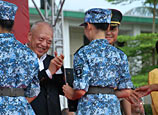
 |
| People line up in front of the Canadian embassy in Beijing to apply for visas on Wednesday. Insiders said a strike by foreign service officers in Canada will have some effect on the processing of visas. [Wang Jing / China Daily] |
Process slowed, but embassy is still processing requests in China
Chinese students heading to Canada to study in September are unlikely to be seriously affected by the Canadian Foreign Service strike, according to a Chinese education consultant.
"The Canada Visa Application Center has not stopped handling visa applications, as some Canadian Foreign Service officers are still at work. It just slows down the process," said Hao Meng with Education International Cooperation Group, a consulting institute on studying abroad.
Most clients who applied for Canadian high school, undergraduate or postgraduate programs and wanted to enroll in September submitted applications in May or June and had received replies, he said.
Hao said it usually takes one or two months for the Canadian embassy to process applications. So the students who applied in May or June are barely affected.
"But for those who submit their applications in or after July, I'm afraid they may not be able to enroll in time this autumn," Hao said.
According to the Professional Association of Foreign Service Officers, a union representing Canada's nonexecutive diplomats, its 1,350 members voted 82 percent in favor of fighting for "equal pay for equal work" in mid-March this year.
An announcement on its website said foreign service officers in Canada are paid C$3,000 ($2,914) to C$14,000 less a year than other employees in the Canadian federal government, including lawyers, economists, policy analysts and commerce officers.
But the Canadian government rejected their request, and foreign service officers went on strike on April 2. Staff members in Beijing, Shanghai, Chongqing and Hong Kong followed suit on June 20.
A staff member with the Canada Visa Application Center in Beijing, who asked to be identified only as Zhang, said there is a strike at the Canadian embassy but not the visa application center.
She said there will be some influence on issuing visas, but students are still submitting applications every day.
"We will continue handing in applications to the embassy for the applicants," she said. "Generally, it takes the embassy four to eight weeks to review an applicant's documents.
"Now it's hard to tell how long it takes, and we can't assure whether the Canadian embassy will issue visas on time," Zhang said, suggesting that the earlier an application is submitted, the better.
Canada is a top destination of choice for visitors and students from China.
According to Citizenship and Immigration Canada, the country issued a record 25,245 study permits to Chinese applicants in 2012.
Canada also expected to receive 370,000 Chinese travelers this year, as the number of Chinese visitors to Canada has seen an annual increase of 20 percent in recent years, making China the fastest-growing tourism market for Canada, according to a report by People's Daily in May.
The strike's influence on tourism is still unknown.
Dai Chunyan, sales manager of the Canadian Tourism Commission in China, declined to comment on the strike's influence on Chinese tourists to Canada, saying they have not received any indication that the number of Chinese travelers to Canada is dropping due to the strike.
Gu Weilai, a 32-year-old woman who works in Shanghai, plans to travel to Toronto in late September or October to visit her friends. She is going to submit her visa applications next week, and said she is not worried at all.
"There are still a couple of months before I set out, and the situation may change by then," she said, believing things will work out in the end.
"But I am prepared for the worst," she said.
"I will let things be if I still cannot go in late September," she said. "It's no big deal. I can go there next year,"
















 Gun fight between police, drug dealers in China's Chengdu
Gun fight between police, drug dealers in China's Chengdu


![]()
